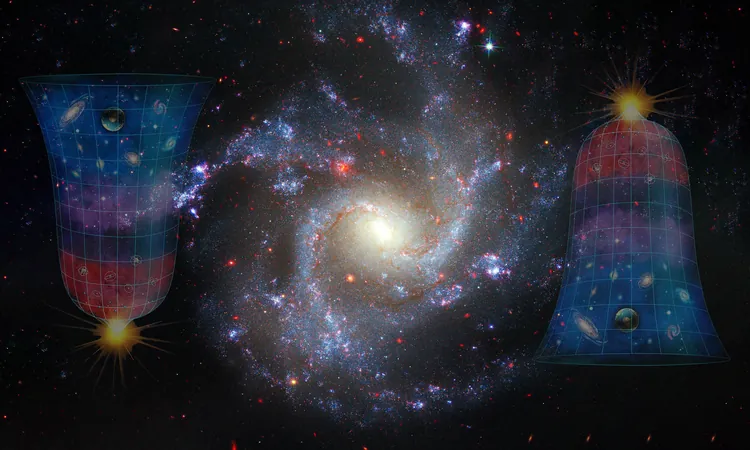
Shocking Revelations About the Universe: What We Thought We Knew Might Be Completely Wrong!
2024-11-30
Author: Lok
Shocking Revelations About the Universe: What We Thought We Knew Might Be Completely Wrong!
In a groundbreaking discovery that has taken the scientific community by storm, researchers are questioning our fundamental understanding of the universe's expansion – a topic that has puzzled astronomers for decades. The key to unraveling this cosmic mystery is known as the Hubble constant, a crucial number that not only affects our knowledge of how galaxies form but also hints at the universe’s age and potential fate.
The Hubble Tension: A Cosmic Puzzle
For many years, scientists have grappled with what’s known as the “Hubble tension,” a predicament in which different methods of measuring the universe's expansion yield conflicting results. Adam Riess, a renowned physicist from Johns Hopkins University and Nobel Prize winner, has been at the forefront of this investigation. “With measurement errors eliminated, we may have uncovered an exciting possibility: that our understanding of the universe is fundamentally flawed,” Riess stated.
Why Is the Hubble Constant So Important?
First observed by Edwin Hubble, who noted that galaxies are moving away from us, this constant is akin to the cosmic glue that helps to map out not just the history of our universe but also its future trajectory. This urgency for precise measurements became heightened with the launch of the Hubble Space Telescope in 1990, which aimed to provide clarity on the universe's expansion rate. Before this, estimates of cosmic age ranged dramatically from 10 to 20 billion years. Now, aided by Hubble's observations of variable stars, we settled on an age of approximately 13.8 billion years—still very much an approximation in the grand scale of things.
Webb Telescope Joins the Race
With suspicions that Hubble's data might have latent flaws, the scientific community anticipated the arrival of the James Webb Space Telescope. Upon its launch, Webb's infrared observations supported Hubble’s findings, suggesting that established measurements might indeed hold water as we venture further into cosmic explorations. “Combining both Webb and Hubble gives us the best perspective over the vast cosmic distance,” Riess noted with enthusiasm.
The Ongoing Battle of Observations
Despite the excitement surrounding Webb’s data, the Hubble tension persists. Measurements taken from the local universe seem inconsistent with those derived from the early universe, particularly observations made by the Planck satellite studying cosmic microwave background radiation. This leaves researchers questioning the very fabric of our reality. Are there hidden elements or variables we’ve missed? Could new physics come into play?
Innovative Measurements Ahead
In a bold new approach, scientists led by Brenda Frye of the University of Arizona embarked on a unique trajectory in October 2024, utilizing gravitationally lensed supernovae to derive the Hubble constant. Their observations of a galaxy cluster detected unusual dots where none had existed before—one turned out to be a Type Ia supernova magnified by gravitational lensing. This method, distinct from earlier techniques, offered a Hubble constant value of about 75.4 kilometers per second per megaparsec, aligning with local universe measurements yet still challenging early universe findings.
What Lies Ahead? The Universe Awaits Answers
This ongoing research leaves many questions unanswered. The “Hubble Tension” indicates either the presence of undiscovered physics governing the cosmos, or maybe the need for alternative explanations regarding dark energy or dark matter. Some tantalizing theories flutter around possible new particles, forces, or dimensional shifts, hinting that our universe may not be uniform after all.
What intrigues scientists is not merely finding answers but how every resolution leads to new queries. As fresh space missions, like the Nancy Grace Roman Space Telescope and Europe’s Euclid mission, loom on the horizon, the eager anticipation for more revelations grows.
The universe is a vast, complex puzzle, reminding us daily of how much still remains beyond the reach of our understanding. The thrill of discovery pushes scientists ever forward, into the unknown depths of space and time, with the promise that every answer brings new mysteries.
Stay tuned, for the cosmos has plenty more secrets to reveal!
 Brasil (PT)
Brasil (PT)
 Canada (EN)
Canada (EN)
 Chile (ES)
Chile (ES)
 España (ES)
España (ES)
 France (FR)
France (FR)
 Hong Kong (EN)
Hong Kong (EN)
 Italia (IT)
Italia (IT)
 日本 (JA)
日本 (JA)
 Magyarország (HU)
Magyarország (HU)
 Norge (NO)
Norge (NO)
 Polska (PL)
Polska (PL)
 Schweiz (DE)
Schweiz (DE)
 Singapore (EN)
Singapore (EN)
 Sverige (SV)
Sverige (SV)
 Suomi (FI)
Suomi (FI)
 Türkiye (TR)
Türkiye (TR)